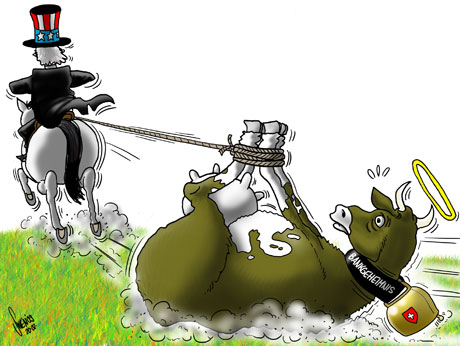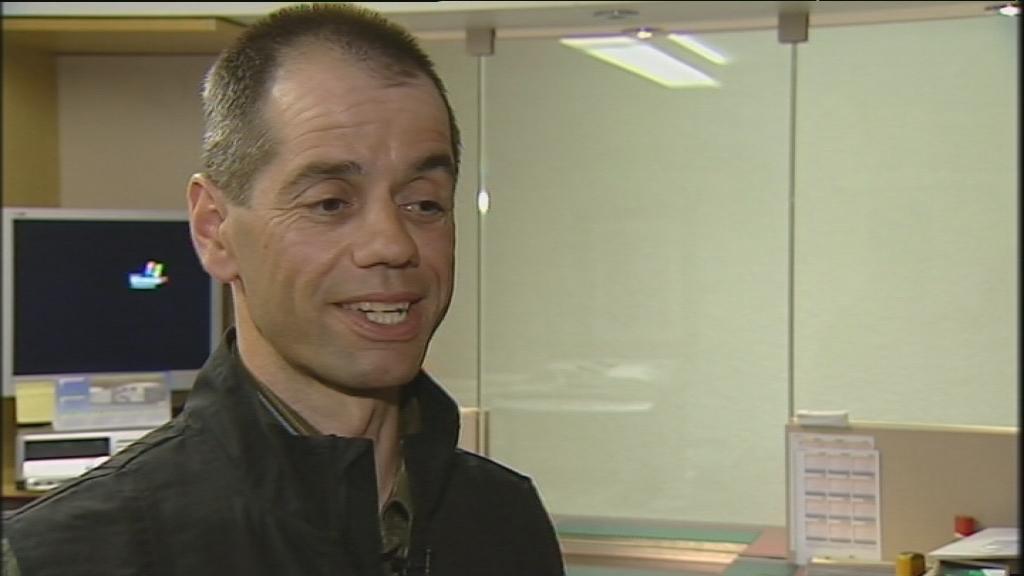Swiss banks must “know their customers”

The fall of Tunisia’s Zine al-Abidine Ben Ali and the uncertain position of Hosni Mubarak in Egypt have once again raised issues about politically-exposed persons (Peps).
Much international attention is focused on their personal banking arrangements and, not surprisingly perhaps, how much money the two leaders and other Peps may have illegally deposited in Swiss bank accounts.
Whereas some people outside Switzerland might believe it easy to open a Swiss bank account and hide behind the privacy of banking secrecy, this is far from being the case.
James Nason, a spokesman for the Swiss Bankers Association, has been telling swissinfo.ch that Swiss banks are obliged by legislation to stick to strict regulations when opening and handling accounts.
swissinfo.ch: How do you open a Swiss bank account?
James Nason: The bank would very much like to see the client in person, so the best way would be physically to go into the bank and explain what sort of an account you want, whether it’s a day-to-day retail banking account or whether you want a private banking relationship going in the direction of wealth management.
Although you can open an account via the internet, you can’t do it completely online because the banks have very strict identification standards. They will require some authenticated document from you proving your identity.
swissinfo.ch: What kinds of control do the banks have in place?
J.N.: There are very strict procedures in place, so-called due diligence procedures which are basically “know your customer” rules. First the bank has to decide if it wants a business relation with this person. If you’re a so-called “politically-exposed person” (Pep), that means somebody holding an important public office in a foreign country, the bank has to assess how much of a legal or reputational risk you might pose.
If it decides to go ahead, one basic question is: Can you prove your identity? The banks are obliged by law to verify the identity of the client so they will want to see some kind of official identification document. Then the third and a very important step is to find out: Are these your assets you’re bringing to the bank or do these assets belong to someone else? The bank is also legally obliged to find out who the beneficial owner of the assets is or are.
swissinfo.ch: What about if I go through an intermediary?
J.N.: There are lots of independent asset managers around who manage assets on behalf of clients but when that person opens an account, they have to sign a special form in which they have to declare who the beneficial owner of the assets is or are. That is a legal obligation.
swissinfo.ch: What about a person who comes in and says: “I want an account. I’m going to give you SFr200 and then comes back a few months later and says: “I want to park SFr200,000 with you now?
J.N.: The bank would definitely contact that client and ask about source of this SFr200,000. They also have to put clients in different risk categories, so for example an 80-year-old grandmother from the next village would be a low-risk client whereas a 28-year-old casino owner from St Petersburg, for example, or a defence minister from a country notorious for corruption would obviously be considered to pose a higher risk. Banks are also obliged to investigate unusual transactions, so first they’ll find out what your normal pattern of financial activity is and if there’s an unusual blip in your financial behaviour they are obliged to investigate and clarify the transaction.
swissinfo.ch: How would they know if there’s a blip?
J.N.: There is very sophisticated computer software you can get now. To spot the unusual you have to know what the usual is for that client so after a few months you can spot the pattern of that client’s account, how much money is going in, what is his or her usual spending patterns are, and if there is an unusual transaction. Metaphorically speaking a red flag will show or a bell will ring alerting the account manager that the transaction has to be clarified.
swissinfo.ch: Much money as you are well aware is in the private banks in Switzerland. What would happen if I go along with my SFr200 there?
J.N.: The real speciality of Swiss banking is what has attracted generations of international clients, not only private clients but also institutional clients, and that is asset/wealth management. To do this successfully the banker has to have a certain amount of assets to start with, so for example if you come into a bank with SFr200, the banker can’t really build a balanced investment portfolio with you for that.
It would just about buy four Nestlé shares, but if you come in say with SFr200,000 then the banker has a serious amount with which to build up a balanced investment portfolio for you, having discussed of course what your financial goals and aims are and what your financial risk appetite is.
swissinfo.ch: Do numbered accounts, which feature in countless films, still exist?
J.N.: I rather cynically say: Have you ever come across a bank account that didn’t have a number? But seriously, you can have so-called “numbered accounts” at Swiss banks and there’s a lot of excitement about them. In fact, the procedure to open a numbered account is exactly the same as an ordinary account. The only thing that’s special is that within the bank, your business is conducted under a number or a code and not under your name.
This is simply an internal security measure within the bank that limits knowledge of your identity to a very small circle of staff, but if for example criminal proceedings are underway, if a Swiss investigating magistrate comes into the bank wanting information in connection with a crime, a numbered account doesn’t offer you any fancy protection whatsoever.
swissinfo.ch: What about protection in other accounts? Does that exist?
J.N.: The default setting in Swiss banking is respect for privacy, and in fact it is a criminal offence to give bank client data to unauthorised third parties. On the other hand, we cannot stress enough that this fabled Swiss banking secrecy has never been 100 per cent absolute. Legislators deliberately built provisions into the law for the rights to privacy to be suspended in a wide range of criminal and civil cases, so on the one hand Swiss banking respects privacy, on the other there are provisions to expose criminals to the full force of the law.
swissinfo.ch: What happens if the bank actually does suspect you are up to no good, as it were?
J.N.: There are very clear regulations in place. If a bank notices a suspicious transaction or it has well-founded suspicions that something like money laundering is going on, the bank is obliged by law to freeze the account and report it to the authorities, the Money Laundering Reporting Office. In some countries a bank would have to wait for a court order in order to freeze the funds but in Switzerland a bank can act on its own initiative. The authorities then have five working days to investigate and then they will tell the bank what to do.
Switzerland has a long experience of dealing with such clients.
As James Nason puts it: “Sometimes the experience is very bad, for example one thinks of Sani Abacha of Nigeria who was basically stealing from his central bank and hiding his money around the world, not in accounts in his own name of course.”
But no plundering dictator opens an account in his own name: they use their relatives, lawyers or other middlemen and even their bodyguards and mistresses.
Being a Pep isn’t in itself bad… but problems arise when he or she starts to take bribes or steals from the central bank.
If a country starts criminal proceedings against a (Pep), it can ask Switzerland for international judicial assistance and the Swiss will freeze the assets if requesting country shows why this is necessary.
Banks have very detailed and sophisticated data bases at their disposal.
They list not only heads of state, wives, children and government ministers, but also senior officials in countries. Bank staff can use it to check the name of a would-be depositor.

In compliance with the JTI standards
More: SWI swissinfo.ch certified by the Journalism Trust Initiative





You can find an overview of ongoing debates with our journalists here. Please join us!
If you want to start a conversation about a topic raised in this article or want to report factual errors, email us at english@swissinfo.ch.